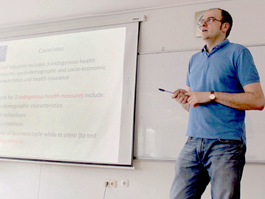On May 29, Dr. Maksym Obrizan, from the Kyiv School of Economics, provided an interesting seminar on the subject of his working paper, "Retirement in HRS participants: the role of endogenous subjective and objective health measures".
The speaker began by introducing the essence of his research. Which factors affect the decision to retire? Existing studies identify factors such as health insurance, financial incentives and, perhaps most importantly, health conditions. However, such studies tend to ignore individual heterogeneity.
In contrast to such studies, Dr. Obrizan has developed a multivariate Probit model in which a retirement decision depends on endogenous subjective and objective health measures. The sample consists of non-retired participants in the 1998 wave of the Health and Retirement Study. It appears that health is a more important factor in retirement decisions than income or money. There is also more evidence of endogeneity of subjective measures of health, in other words one’s self estimation and attitude to one’s own health condition, in comparison to objective measures.
The presenter then spoke about the “fetal origin Hypothesis”, or the so-called Barker Hypothesis, according to which, nine months in utero significantly affects an individual’s future health and abilities. The paper suggests a test for this hypothesis. Using the Dow Jones Industrial average daily indices, the author measured the influence of economic recessions on members of the above mentioned sample. The results indicated that economic recessions during the time in the womb do not have any negative effects on subsequent health.
ISET would like to thank Dr. Maksym Obrizan for presenting a seminar on a very interesting topic to the ISET community.











